Part three of a four-part series on Semester at Sea and Colorado State University
This four-part series explores the experience of Semester at Sea through the eyes of School of Education faculty member and Assistant Vice President for Student Affairs Jody Donovan. Part three shares Donovan’s experience as dean of student life and as a SAS voyager.
Missed the beginning of this series? Find them here:
- Part one: Global learning, tight-knit community, focus of shipboard campus
- Part two: Semester at Sea connects onboard learning with in-country experiences
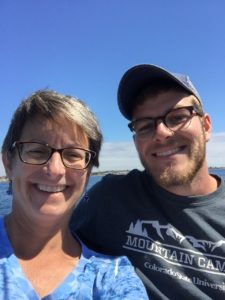 Assistant professor, adviser and co-chair of the Student Affairs in Higher Education master’s degree program, Donovan has worked in student affairs for more than 30 years. Currently serving Colorado State University as the assistant vice president of student affairs and dean of students, in addition to her roles in the SAHE program, Donovan works with more than 30,000 students from all walks of life across CSU.
Assistant professor, adviser and co-chair of the Student Affairs in Higher Education master’s degree program, Donovan has worked in student affairs for more than 30 years. Currently serving Colorado State University as the assistant vice president of student affairs and dean of students, in addition to her roles in the SAHE program, Donovan works with more than 30,000 students from all walks of life across CSU.
For Donovan, being immersed in student affairs is more than a job. She is passionate about educating, supporting, and guiding students to build community, grow into their strengths, and leverage their experiences to make the world a better place. When the opportunity to do these things on a smaller scale presented itself, Donovan was literally on board.
Donovan’s 105 days as dean of student life for nearly 600 students felt a little like a vacation, she said.
“The staculty kept asking me if I was doing okay, being so busy with the students on the ship from sun-up ‘til midnight. For me, it was a break from my usual life with four different roles and many, many more students on the CSU campus,” said Donovan.
With complete sincerity, however, Donovan shared that her time at sea confirmed to her that – 30 years into the profession – she is in the right place.
“It affirmed that I love what I do, and that I love students.”
Dean of student life
Because she was immersed in the day-to-day experience of SAS, Donovan was able to build connections and relationships with students. She was able to talk with them about what they were learning in the classroom and what they were experiencing in port. She could engage with them about making good choices and learning from experiences, and talk about how they were handling being so far from home.
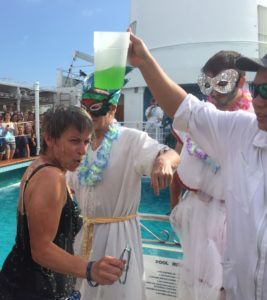 “I was able to help build the community, to set a positive tone for the community,” she said. “We set high expectations for behavior. We modeled watching out for one another. At CSU, Rams take care of Rams. On the ship, ‘SASers’ take care of SASers.”
“I was able to help build the community, to set a positive tone for the community,” she said. “We set high expectations for behavior. We modeled watching out for one another. At CSU, Rams take care of Rams. On the ship, ‘SASers’ take care of SASers.”
Another aspect of the job was problem-solving. Donovan worked with the staculty, learning which students had what needs and determining the best ways to meet those needs. She made referrals to the counselors on board, noting that students on board experienced similar struggles to students on campus.
“Anxiety was huge,” she said. “Lots of students dealing with anxiety, with being away from home and on their own for the first time. Some felt overwhelmed, stressed, or homesick. Introverted students in particular struggled – we had to figure out how best to support them.”
Donovan also worked to ensure the community was welcoming and affirming for students of color, and advocated for students of limited income who needed additional financial support for in-country excursions. As the liaison with staculty, she spent time coaching them on discussing cultural appropriation with students, particularly during in-country excursions when students might purchase souvenirs that might be culturally insensitive.
“All in all,” said Donovan, “the job was proactive, educational, and included a lot of student development – and I loved it.”
Being intellectually, emotionally, and physically stretched
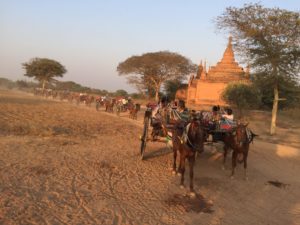 The time spent in Ghana, said Donovan, is the in-country experience that impacted her most deeply on emotional, intellectual, and physical levels. She elected to serve as the liaison during the Golden Triangle experience, a four-day bus ride around the country of Ghana.
The time spent in Ghana, said Donovan, is the in-country experience that impacted her most deeply on emotional, intellectual, and physical levels. She elected to serve as the liaison during the Golden Triangle experience, a four-day bus ride around the country of Ghana.
“The experience was intellectually challenging,” she shared, “because I discovered that what I had previously learned about things that were done to those who were enslaved was nothing compared to witnessing the harm and inhumanity that was done to slaves. It brought me face-to-face with the rivers where people had their last baths before being thrown into dungeons for weeks or even months before being packed into ships for journeys that ended in either death or slavery. The experience was educational, but on the backs of others – it felt terrible. I can’t put into words, or forget, the impact that had on me. It was rough.”
During the four-day journey through Ghana, the SAS participants engaged with people in villages along the way, experiencing life in sub-Saharan Africa. The villagers shared their homes, their food, and their culture with their guests.
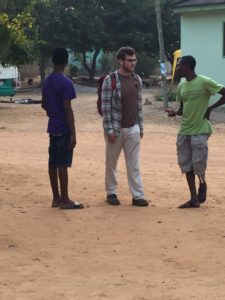 “We engaged with the people,” said Donovan. “We saw how hard they worked and what little they had – but even though they had very little, they were willing to share it. They were gracious, generous, caring, and welcoming. Emotionally, it was difficult because we built those connections, but knew the relationship was for a short time.”
“We engaged with the people,” said Donovan. “We saw how hard they worked and what little they had – but even though they had very little, they were willing to share it. They were gracious, generous, caring, and welcoming. Emotionally, it was difficult because we built those connections, but knew the relationship was for a short time.”
The experience was also physically grueling, Donovan shared. With temperatures of more than 100 degrees and humidity levels reaching 99 percent but no rain, the environment was much different from what she knows in Colorado. Their amount of drinking water was limited; as a vegetarian, Donovan’s food options were also limited.
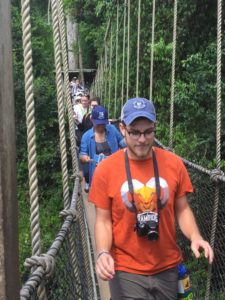 “I was physically uncomfortable most of the time.”
“I was physically uncomfortable most of the time.”
Reflecting on her experience, Donovan said she had to decide what to do with what she learned.
“My responsibility is first, to talk about it,” she said. “I have to figure out how to use it to impact our students at CSU – to teach them to understand that life is different in other places, and life is good in other places, even if it might not look good through our lens. I want to teach our students to want to give what we have to those who need more, and how to learn from others about what makes their lives meaningful.”
The School of Education is part of CSU’s College of Health and Human Sciences.
Stay tuned for the series conclusion. To see Donovan’s SAS photos, visit the album on Flickr.